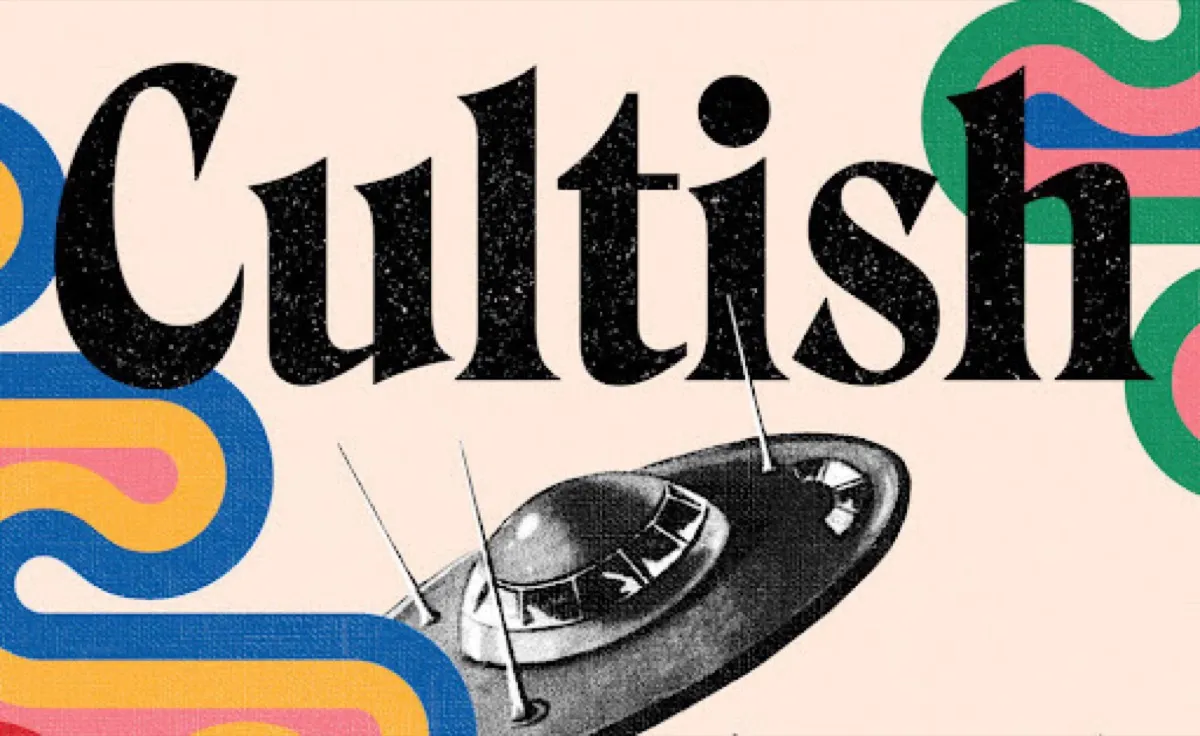What’s the difference between being a fan and being a member of a cult? Despite popular use of the term, it isn’t “brainwashing,” which Cultish author Amanda Montell debunks in her new book. In fact, there’s no clear-cut tipping point at all, which is part of what makes cults seem so dangerous and mysterious. The one thing these groups have in common is how their leaders use language—and that’s something that can also be said of religious groups, fitness programs, sports teams, fandoms, and more, all of which can fall under the umbrella of cultishness.
“Cults have always been something of an obsession of mine,” Montell tells The Mary Sue. She describes growing up with research scientist parents, who taught her to ask questions and be skeptical from an early age. Plus, Montell’s dad was forced into the Synanon cult when he was a teenager and escaped after years of sneaking off the Bay Area compound to attend public school. Montell grew up with his stories, and it sparked her interest in cults and cultishness: “The most interesting parts of [his stories] had everything to do with the special language that Synanon created, to do everything a cult needs to do to maintain power.
“I always sort of saw whispers of cult influence everywhere,” Montell explains. “Not just in the groups that we think of as cults, these remote communes and things like that, but in our everyday lives. In the theater program I was in during high school and the startup I worked at in my early 20s, I saw how similar techniques of conditioning and coercion showed up in spaces you otherwise might not think to look.”
In Cultish: The Language of Fanaticism, Montell breaks down some of the most notorious cults in history, including Jonestown and Heaven’s Gate, as well as fringe religions like Scientology. Additionally, she looks at groups that aren’t necessarily full-on cults, but do employ cultish language to keep their followers, members or subscribers motivated to live according to certain standards or practices. These range from SoulCycle, Crossfit and even Alcoholics Anonymous (AA), to social media influencers and multi-level marketers.

(Rick Loomis/Getty Images)
Montell came up with the idea for Cultish in early 2017, during a somewhat unexpected conversation. Three years later, she says she could never have predicted the rise of QAnon and other online cults, or just how relevant the book would become as she was writing it—especially in light of the ongoing COVID-19 pandemic.
“The idea for the book snapped into focus for me when I was talking to a close friend who had just started going to AA, which obviously is a ‘cultish’ group that serves a really positive role in her life. She’s a skeptical person and suspends her disbelief with some of the stuff that goes on there, but she was telling me about the slogans and mantras, the robust lexicon AA has and uses in order to create solidarity and transcendence and loyalty,” Montell says. “As we were talking, I was like, ‘Holy shit, I have to write a book about the language of cults.’”
Now, Montell says there’s been an uptick in cultish activity, especially in the United States. She explains, “Cultishness, in this country especially, tends to spike during periods of intense sociopolitical turbulence, so that’s why we saw the rise of so many alternative religions during the ‘60s and ‘70s, because that was the time of the Vietnam War and the Civil Rights Movement and the Kennedy assassination. Those things knocked Americans existentially unsteady, if you will, so they were moving away from mainstream sources of support and spirituality, but still craving connection and answers and closure.
“That’s what we’re seeing now,” she continues.” There’s so much tumult because of the pandemic and Trump and our increasing mistrust in so many of the institutions that weren’t providing us support. The difference now is that the internet has made it really easy for people to find one another, to assemble, to radicalize, to form little ideological niches. For better or for worse, there’s now a cult for everyone. The fact that they’re online makes them seem less harmful or less risky … but QAnon and certainly the insurrection at the capital show that ideological sects that form online can have real, material, violent consequences. And it doesn’t even need to get to that point to be dangerous.”

(Samuel Corum/Getty Images)
Although the point of connection may be different (and at least partially determined by the algorithm), Montell says online cults rely on language just as much as pre-internet ones. In Cultish, Montell breaks down these patterns, including thought-terminating clichés, which many readers will recognize in phrases like “Boys will be boys” or “It is what it is.” The term was coined in the 1960s by psychologist Robert Jay Lifton, and it describes stock phrases that can be easily memorized and repeated to shut down independent thinking or questioning. Montell tells The Mary Sue that cultish leaders from Jim Jones to Jeff Bezos use thought-terminating clichés.
“Questioning is the enemy to any cult, so cultish leaders need a repertoire of stock phrases in order to halt people from expressing dissent. Thought-terminating clichés come in many forms. In Synanon, one of the best-known and most widely-used was the phrase ‘Act as if,’ and it was basically an imperative to get people to literally act as if they believed in certain rituals or protocols or rules until they did. Phrases like that are really compelling, because it’s a lot of work to have to think, and it’s a relief not to have to,” Montell explains.
“They alleviate cognitive dissonance, or that uncomfortable feeling you have when you hold two conflicting ideas in your brain at the same time. If you really want to believe in this group and you want all the promises it made to be true, but you also take issue with some of the things you see and someone serves you the phrase ‘Act as if,’ that puts your questioning and cognitive dissonance to bed, at least temporarily.”
Montell also debunks “brainwashing,” which simply doesn’t exist. “It’s just a metaphor,” Montell says. “That might seem obvious to some people, but I always thought of it as an actual, psychological thing. It’s not a real or testable phenomenon. It’s often used to pass judgment on people or morally divide us in some way. Language cannot brainwash you. Language cannot get you to believe something that you don’t already, on some level, want to believe. It can give you license to believe something you already want to believe, and send you down a rabbit hole into extremism from there.”
Montell says she was surprised to learn this, and she was also surprised to learn how many cult survivors are “incredibly bright,” which flies in the face of how cultists are painted in media: desperate, lonely, gullible individuals who get sucked into cults because they don’t know any better.
“Their fatal flaw, if anything, is being way too optimistic that solutions to the world’s most urgent problems actually exist, and that by striking up with this guru or this group, they can actually have access to those solutions,” Montell says. “If you’re confused as to how anyone could end up in a cultish group, then all you really have to know or relate to is how it feels to end up in a toxic, one-on-one relationship. The methods of manipulation are really, really similar. A toxic relationship is just a cult of one.”
That said, some groups or leaders that employ cultish language really do want to do good things or help their followers live better lives, and it’s difficult to determine the difference between these groups and actually harmful cults. Montell says she looks at cultish groups on a spectrum: “As convenient or simple as it would be to divide them into good cult/bad cult, or cult/not a cult, these groups fall along a continuum. You can name any number of criteria that makes something a more destructive cult than another kind of group, but there’s no hard and fast line.”
Again, it comes down to language. Montell’s friend in Alcoholics Anonymous is able to use the group’s lexicon in their sobriety journey, which is a super positive use of that language. Another friend of Montell’s works for a cancer non-profit. “Some of the language they use to generate solidarity and loyalty among employees and volunteers, to get them excited to fundraise and stuff, is so culty,” Montell reveals. “But there’s nothing inherently bad about using buzzwords and mantras to form a sense of connection or assemble people around a big, collective mission.
“Engaging in a mantra or a chant or some buzzwords if you’re in a certain ritual space and ritual time where that language is sacred and reserved for that space, that is not a bad thing,” Montell says. “It’s profoundly human to want to engage in spiritual, linguistic rituals with other people who are doing the same. We are communal by nature. When this language works to get you to morally divorce yourself from some inferior other for no good reason, or to halt your independent thinking and increase conformism, that’s when it starts getting a little too cultish for comfort.”
Therefore, being wary of this kind of language may not be the best solution. Instead, Montell says people should try to be aware: Notice how many thought-terminating clichés a group uses, and whether they have a stark us-vs-them mentality. Examine emotionally-charged language that pumps you up, even when you don’t know why, and be sure to question language that can’t be translated easily into plain English, or that doesn’t mean anything when it is.
Montell also says people should be wary of putting all their faith into a single person, especially celebrities or influencers. Although she only briefly mentions fandom in Cultish, Montell digs deeper in her podcast, Sounds Like a Cult, which she cohosts with documentary filmmaker and comedy writer Isabela Medina-Maté. During our interview, Montell says that as parasocial relationships are continuously blurred through social media, which gives us unprecedented access to the creators we love on a sometimes too-intimate basis, stan culture can even take on a life of its own, through intense herd mentality.
“You don’t even need a unifying leader to tell the group what to do,” Montell says. “They’re going to do it on their own and they’re going to radicalize on their own. People are looking for direction, answers, and an identity. Young people make up the demographic of these standoms, mostly, and this is a really hard time to be a young person forming your identity. With social media, we see more options for directions that your life could go in than ever before. … Being able to put your faith into a celebrity or a standom gives you an identity template. When you wake up in the morning, it’s like, ‘What would a Swifty wear? What would a Swifty eat for breakfast? What would a Swifty read? What would a Swifty care about today?’ It minimizes the number of decisions you have to make to a more manageable few. You know who you are. You’re a Swifty.”
Cultish: The Language of Fanaticism is available everywhere books are sold. New episodes of Sounds Like a Cult are released Tuesdays.
(featured image: Harper Wave)
Want more stories like this? Become a subscriber and support the site!
—The Mary Sue has a strict comment policy that forbids, but is not limited to, personal insults toward anyone, hate speech, and trolling.—










Published: Jul 20, 2021 03:27 pm